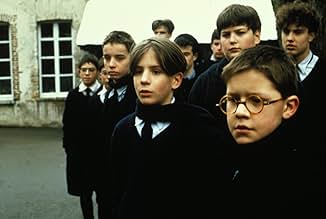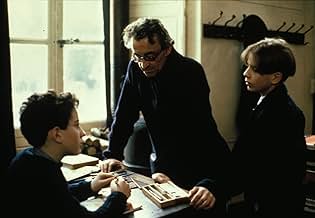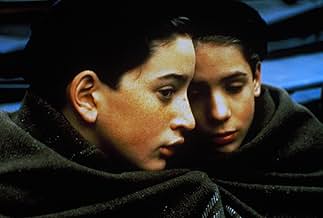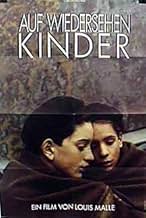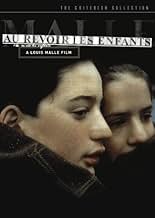VALUTAZIONE IMDb
8,0/10
37.753
LA TUA VALUTAZIONE
In un collegio francese durante la seconda guerra mondiale, arriva un nuovo studente. Diventa il compagno di stanza del miglior studente della sua classe. All'inizio rivali, i compagni di st... Leggi tuttoIn un collegio francese durante la seconda guerra mondiale, arriva un nuovo studente. Diventa il compagno di stanza del miglior studente della sua classe. All'inizio rivali, i compagni di stanza formano un legame e condividono un segreto.In un collegio francese durante la seconda guerra mondiale, arriva un nuovo studente. Diventa il compagno di stanza del miglior studente della sua classe. All'inizio rivali, i compagni di stanza formano un legame e condividono un segreto.
- Regia
- Sceneggiatura
- Star
- Candidato a 2 Oscar
- 28 vittorie e 12 candidature totali
Stanislas Carré de Malberg
- François Quentin
- (as Stanislas Carré De Malberg)
Luc Etienne
- Moreau
- (as Luc Étienne)
Recensioni in evidenza
This movies is one of those movies that you can love, but hate. It makes you hate what happens in the movie. You get so attached to the characters, and when things happen to them, you hate it. But the movie is powerful, wonderfully written and directed by Louis Malle and defiantly should be seen anytime one is studying WWII or the Holocost, or if you have free time, and are looking for a good heart-wrencher. I watched it in French, with subtitles, and that makes it all the better.
In 1944, the upper class boy Julien Quentin (Gaspard Manesse) and his older brother François travel to the Catholic boarding school in the countryside after vacations. Julien is a leader and good student and when the new student Jean Bonnet (Raphael Fejtö) arrives in the school, they have friction in their relationship.
However, Julien learns to respect Jean and discovers that he is Jewish and the priests are hiding him from the Nazis. They become best friends and Julien keeps the secret of the origins of Jean. When the priest Jean (Philippe Morier- Genoud) discovers that the servant Joseph (François Négret) is stealing supplies from the school to sell in the black market, he fires the youth. Sooner the Gestapo arrives at school to investigate the students and the priests that run and work in the boarding school.
"Au Revoir les Enfants" is an awarded film written and directed by Louis Malle apparently based on true events during World War II in the boarding school where he studied. The touching story of friendship and betrayal is beautiful and sad, and the boys have great performances. Louis Malle highlights the despicable behavior of collaborators and traitor and the most impressive, the German soldiers are tough but respectful with the French civilians. My vote is eight.
Title (Brazil): "Adeus, Meninos" ("Goodbye, Boys")
However, Julien learns to respect Jean and discovers that he is Jewish and the priests are hiding him from the Nazis. They become best friends and Julien keeps the secret of the origins of Jean. When the priest Jean (Philippe Morier- Genoud) discovers that the servant Joseph (François Négret) is stealing supplies from the school to sell in the black market, he fires the youth. Sooner the Gestapo arrives at school to investigate the students and the priests that run and work in the boarding school.
"Au Revoir les Enfants" is an awarded film written and directed by Louis Malle apparently based on true events during World War II in the boarding school where he studied. The touching story of friendship and betrayal is beautiful and sad, and the boys have great performances. Louis Malle highlights the despicable behavior of collaborators and traitor and the most impressive, the German soldiers are tough but respectful with the French civilians. My vote is eight.
Title (Brazil): "Adeus, Meninos" ("Goodbye, Boys")
In this spellbinding film, Louis Malle is able to evoke the fear and sadness some children suffer while away from home at a boarding school, the loneliness. Yet he doesn't dwell on sentimentality but only skims it, instead peppering the scenes with the bravura and faux assertiveness of adolescents. Malle and the actors adroitly juggle circumstances and emotions. Ultimately, they capture a terrifying time in history through the eyes and uncertainty of boys who aren't as grown-up as they'd like to think.
The two main characters, Julien Quentin and Jean Bonnet, are beautifully portrayed by two very capable and talented young actors. The supporting cast is equally impressive. The film is directed with a touch of genius, and holds its own when compared to another motion picture masterpiece, To Kill a Mockingbird.
The two main characters, Julien Quentin and Jean Bonnet, are beautifully portrayed by two very capable and talented young actors. The supporting cast is equally impressive. The film is directed with a touch of genius, and holds its own when compared to another motion picture masterpiece, To Kill a Mockingbird.
This is a very moving film, most likely based on an actual event. The Carmelite priest,Lucien Bunel (1900-1945, "Pere Jacques") was founder and director of the Petit College d'Avon, near Fontainebleau. He was arrested on Jan. 15, 1994, accused of hiding 3 Jewish boys among his students, and was deported to the infamous Mauthausen concentration camp. He died in Linz, Austria on June 2, 1945. Malle's film depicts the intense trauma of Jewish children who were separated from their families and forced to take on a new identity in hiding, always afraid of being found out. They also faced the dilemma of how to maintain their Jewishness in the setting of a Catholic school. So, not just another war movie, this film depicts some of the real struggles facing hidden children, many of whom were saved by courageous Christians in Europe.
10Sloke
The movie was a project close to Louis Malle's heart (he was in tears when the film premiered at a film festival in 1987) and it shows in the multi-layered treatment he gives the central setting, this fascinating boarding school with its broad cast of characters. Because there are so many different strands and affecting moments tangential to the central plot, one is not entirely prepared for the finale even if you are expecting it. French film is characteristically digressive, often to a fault, but here it works to splendid advantage. It also lends itself to repeat viewings.
I don't think you need to have lived in occupied Europe to appreciate this wonderful film; it speaks to all of us who have lived through childhood's quickly-passing parade and know its lifelong regrets. That last image of the stone wall is emblazoned in many consciousnesses, as it is in mine.
There are many interesting choices Malle makes in this film. For example, while the central subject is the Holocaust, nearly all the Germans we actually see in the film are fairly decent if nonetheless menacing types. The real villains here are almost entirely French collaborators, which was done I think to call attention to collaboration during a period when the French were dealing with the Klaus Barbie trial. [Barbie was a Gestapo officer who was aided in his work rooting out Resistance leaders by many French collaborators.] But casting French people as the heavies also suggests the central evil of prejudice and oppression is not something exclusive to one nationality, and it broadens the scope of the movie.
The tender treatment Malle affords the Catholic hierarchy in the movie is unusual, too, when you see other more anti-clerical Malle efforts like "Murmur of the Heart." There is an unexpected sense of spirituality throughout this film, somewhat muted but there all the same.
This may well stand as the cinematic masterpiece of a man who, at his best (see also "Atlantic City" and "My Dinner With Andre") was to motion pictures what his countrymen Zola and Hugo were to novels: An artist who filled his canvas with the verve and breadth of human life.
I don't think you need to have lived in occupied Europe to appreciate this wonderful film; it speaks to all of us who have lived through childhood's quickly-passing parade and know its lifelong regrets. That last image of the stone wall is emblazoned in many consciousnesses, as it is in mine.
There are many interesting choices Malle makes in this film. For example, while the central subject is the Holocaust, nearly all the Germans we actually see in the film are fairly decent if nonetheless menacing types. The real villains here are almost entirely French collaborators, which was done I think to call attention to collaboration during a period when the French were dealing with the Klaus Barbie trial. [Barbie was a Gestapo officer who was aided in his work rooting out Resistance leaders by many French collaborators.] But casting French people as the heavies also suggests the central evil of prejudice and oppression is not something exclusive to one nationality, and it broadens the scope of the movie.
The tender treatment Malle affords the Catholic hierarchy in the movie is unusual, too, when you see other more anti-clerical Malle efforts like "Murmur of the Heart." There is an unexpected sense of spirituality throughout this film, somewhat muted but there all the same.
This may well stand as the cinematic masterpiece of a man who, at his best (see also "Atlantic City" and "My Dinner With Andre") was to motion pictures what his countrymen Zola and Hugo were to novels: An artist who filled his canvas with the verve and breadth of human life.
Lo sapevi?
- QuizBased on an incident from Louis Malle's own youth. Julien is modeled after Malle.
- BlooperWhen hiking, Julien asks what day it is and is told that it's Thursday, January 17th, 1944. That date was actually a Monday.
- Curiosità sui creditiPour Cuotemoc, Justine et Chloé. (opening credits)
I più visti
Accedi per valutare e creare un elenco di titoli salvati per ottenere consigli personalizzati
- How long is Au Revoir les Enfants?Powered by Alexa
Dettagli
- Data di uscita
- Paesi di origine
- Sito ufficiale
- Lingue
- Celebre anche come
- Au Revoir les Enfants
- Luoghi delle riprese
- Aziende produttrici
- Vedi altri crediti dell’azienda su IMDbPro
Botteghino
- Lordo Stati Uniti e Canada
- 4.542.825 USD
- Lordo in tutto il mondo
- 4.575.613 USD
- Tempo di esecuzione
- 1h 44min(104 min)
- Colore
- Mix di suoni
- Proporzioni
- 1.66 : 1
Contribuisci a questa pagina
Suggerisci una modifica o aggiungi i contenuti mancanti

![Guarda Bande-annonce [VOST]](https://m.media-amazon.com/images/M/MV5BZDlkMTI5OTgtNmU4My00MzRjLWFkNzMtYmMyMDlhNjQ2OTFmXkEyXkFqcGdeQXRyYW5zY29kZS13b3JrZmxvdw@@._V1_QL75_UX500_CR0)
